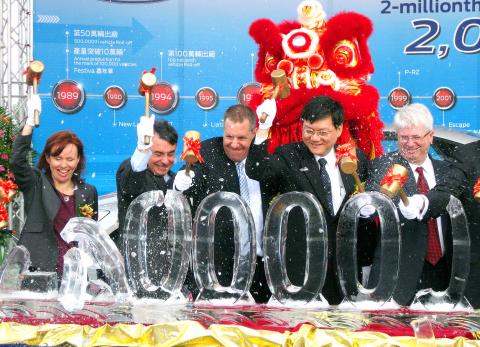Ford Motor Co, the second--biggest US automaker, is unfazed by growing competition from the Asia--Pacific and African (APA) automobile industry and is aiming to grow its business with a rollout of more models to customers in the region.
“Ford, for many years, has not brought all its products to the APA for different reasons. But our plans for the next several years are to bring a significant number of great products and develop new ones to add to the current product portfolio for the APA,” said Joe Hinrichs, president of Ford’s Asia-Pacific and Africa operations.
In Taiwan Ford will add four vehicle models within the next three years as part of its expansion plan in the region, he said.

Photo: CNA
Hinrichs refused to divulge the details, but said “most” of these models will be produced in Taiwan and are tailored for the consumers here.
“That [variety of offerings] gives us confidence and excitement when competing with all competitors in the APA, including Luxgen and Toyota,” he said.
Taiwan’s Yulon Motor Co (裕隆汽車) is set to introduce its own-brand vehicle Luxgen to China next year, after seeing great success on its home turf.
Luxgen boasts global positioning, night vision and blind-spot cameras — and at NT$800,000 (US$25,000), the company hopes it will appeal to tech-savvy and moderately wealthy Chinese consumers.
Hinrichs was in Taiwan for a one-night stopover to attend the 2 millionth vehicle rollout ceremony at Ford Lio Ho Co’s (福特六和) plant in Jhongli (中壢), Taoyuan County.
Set up in 1972, Ford Lio Ho is a joint venture between Ford and Lio Ho Group.
Ford predicts that over the next decade, 70 percent of the company’s business growth will be driven by the APA region, mainly China, India, South Africa and ASEAN, Hinrichs said.
The APA vehicle industry has a projected market of more than 30 million units this year, dominated by China, with 18 million, he said.
Ford lost US$86 million in the APA market last year, but it reversed the loss with earnings of US$166 million for the first three quarters on strong demand from China, where the second-largest contributor to GDP growth is the automotive sector.
“China is all about growth and the auto industry is growing very rapidly,” Hinrichs said.
The company said its vehicle sales in China for the first 10 months rose 40 percent from last year, and it is ushering in “record sales” for the year.
For Taiwan, the market is expected to improve next year, when as many as 330,000 cars are likely to be sold, Ford Lio Ho president Albert Li (李國寶) said.
“There is no sign of cooling down and my expectation is that the market next year will be steady at the minimum, but I see there could be some upside,” he said.

UNCERTAINTY: Innolux activated a stringent supply chain management mechanism, as it did during the COVID-19 pandemic, to ensure optimal inventory levels for customers Flat-panel display makers AUO Corp (友達) and Innolux Corp (群創) yesterday said that about 12 to 20 percent of their display business is at risk of potential US tariffs and that they would relocate production or shipment destinations to mitigate the levies’ effects. US tariffs would have a direct impact of US$200 million on AUO’s revenue, company chairman Paul Peng (彭雙浪) told reporters on the sidelines of the Touch Taiwan trade show in Taipei yesterday. That would make up about 12 percent of the company’s overall revenue. To cope with the tariff uncertainty, AUO plans to allocate its production to manufacturing facilities in

Taiwan will prioritize the development of silicon photonics by taking advantage of its strength in the semiconductor industry to build another shield to protect the local economy, National Development Council (NDC) Minister Paul Liu (劉鏡清) said yesterday. Speaking at a meeting of the legislature’s Economics Committee, Liu said Taiwan already has the artificial intelligence (AI) industry as a shield, after the semiconductor industry, to safeguard the country, and is looking at new unique fields to build more economic shields. While Taiwan will further strengthen its existing shields, over the longer term, the country is determined to focus on such potential segments as

TAKING STOCK: A Taiwanese cookware firm in Vietnam urged customers to assess inventory or place orders early so shipments can reach the US while tariffs are paused Taiwanese businesses in Vietnam are exploring alternatives after the White House imposed a 46 percent import duty on Vietnamese goods, following US President Donald Trump’s announcement of “reciprocal” tariffs on the US’ trading partners. Lo Shih-liang (羅世良), chairman of Brico Industry Co (裕茂工業), a Taiwanese company that manufactures cast iron cookware and stove components in Vietnam, said that more than 40 percent of his business was tied to the US market, describing the constant US policy shifts as an emotional roller coaster. “I work during the day and stay up all night watching the news. I’ve been following US news until 3am

COLLABORATION: Given Taiwan’s key position in global supply chains, the US firm is discussing strategies with local partners and clients to deal with global uncertainties Advanced Micro Devices Inc (AMD) yesterday said it is meeting with local ecosystem partners, including Taiwan Semiconductor Manufacturing Co (TSMC, 台積電), to discuss strategies, including long-term manufacturing, to navigate uncertainties such as US tariffs, as Taiwan occupies an important position in global supply chains. AMD chief executive officer Lisa Su (蘇姿丰) told reporters that Taiwan is an important part of the chip designer’s ecosystem and she is discussing with partners and customers in Taiwan to forge strong collaborations on different areas during this critical period. AMD has just become the first artificial-intelligence (AI) server chip customer of TSMC to utilize its advanced